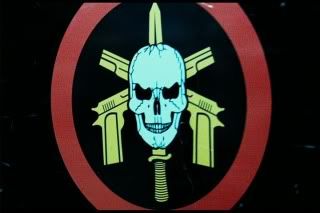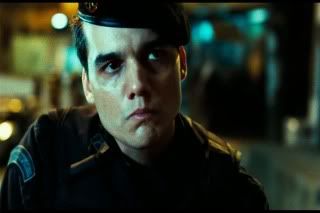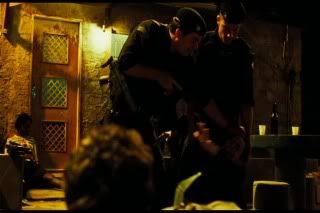
- Stanley Milgram (1974)
American Social Psychologist

According to Captain Nascimento (Wagner Moura), a commanding officer in BOPE (Batalhão de Operações Policiais Especiais - Portuguese for Special Police Operations Battalion), in 1997 there were over 700 favelas, or slums, in Rio de Janeiro, Brazil. Each slum is run by gang, and each of these gangs sell drugs. Your average cop--underpaid, and with everything to lose--has little reason to risk life and limb entering the unfamiliar, labyrinthine slums, and facing God knows what kind of resistance. And so there’s BOPE, an elite special forces unit with experience in urban warfare, advanced weaponry, and little respect for civil liberties or the law. Their logo is two pistols crossed behind a skull, which has a knife sticking through it. The message is clear: these dudes are bigger bad-asses than the drug dealers.
The actual narrative of the film is fairly simple: Captain Nascimento wants to leave the squad; he’s been doing it for a long time, and his wife is expecting their first child. His problem is that he can’t leave his men in the lurch, and so he’s determined to find an adequate replacement, someone who can lead his men into battle, and someone who can be as deadly and ruthless as himself. Two of the few honest cops in Rio present themselves as possibilities: André Matias (André Ramiro), an intellectual cop who lives a double life as a law student, and Neto (Caio Junqueira), a more direct, hard-nosed cop who is in charge of the police vehicle pool. The film follows Matias and Neto as the go from regular cops to BOPE recruits, delving deeper and deeper into the world of drugs and poverty, and into the chauvinistic and authoritarian world of the Elite Squad.

Director José Padilha’s (BUS 174) film is less a standard crime film, a simple case of cops and robbers, and more an investigation of the system. I might as well capitalize it: The System. I was recently listening to David Simon’s commentary on the first episode of HBO’s “The Wire,” and he explained that the show wasn’t really about cops; it was about how individuals are always compromised by institutions, whether that institution be a criminal one or a legitimate one. That comment works equally well for ELITE SQUAD, where the stresses of The System are always apparent, and where everyone is just as much a victim as they are a villain.
The quotation I put at the start of this review comes right from the start of the film. Many viewers, who (rightfully) see BOPE as a fascist police force, may read this quotation as an excuse for the Nascimento’s actions. He is, after all, completely ruthless: his men shoot gang members, often only children, on sight, and engage in torture and raids that are clearly illegal. The quotation, from the psychologist Stanley Milgram, could be seen to pardon his authoritarian behaviour. A closer reading, though, might show that the quotation applies to everyone in the movie. Confronted with overwhelming opposition and an incompetent police force, Nascimento (and BOPE in general) cannot help but react as they do. And the gang members, surrounded with such entrenched and systemic poverty, cannot help but turn to a life of crime, as one of the only ways towards empowerment. And the regular police, faced with low wages and the constant threat of the gangs, cannot help but turn a blind eye, and perhaps find other (illegal) ways to pay the bills. It’s not the character of the people in the situation, but the situation itself, as Milgram seems to be saying.

Milgram’s quote has a little extra significance, when you realize that he’s the researcher behind the “Milgram experiment on obedience to authority figures,” the infamous experiment which “measured the willingness of study participants to obey an authority figure who instructed them to perform acts that conflicted with their personal conscience.” This is the experiment where (in brief) the subject was led to believe that he was dispensing massive electric shocks to another participant (actually an actor) every time that participant answered a question incorrectly. The experimenter was present, and his role was to keep telling the subject that the shocks were necessary, that he had to keep administering them. “In Milgram's first set of experiments, 65 percent (26 of 40) of experiment participants administered the experiment's final massive 450-volt shock.” The implication (one which has been critiqued at length, I believe) is that people respond to authority figures, even if there’s no real reason to do so, and even if it means harming others.
So, who is an authority figure, in ELITE SQUAD? Everyone and no one, it seems. The members of BOPE are both the experimenters, in this parallel, and the subjects, who are willing to harm others simply because they’re told that they must. But at least this much is clear: in extreme situations, people do extreme things, regardless of their character.

Wagner Moura has been rightfully applauded for his performance as Captain Nascimento. Moura portrays a man on the edge of a nervous breakdown, and as his stress level increases, so does his ruthlessness. You can see the stress of going into the favelas getting to him; in one late-night raid, his hand visibly shakes, and he looks on the edge of puking. And the only way for him to get past these physical manifestations of his stress (and perhaps his conscience) is to act out violently. He might be a monster, but he’s a monster for a reason, because of the situation he’s been put into. It doesn’t excuse his actions, but it certainly explains them.
ELITE SQUAD can be seen as a nice companion piece to CITY OF GOD, Brazil’s most famous film of the last decade. Like this more well known film, ELITE SQUAD takes the viewer into the poverty-stricken favelas, and shows how hard it can be just to live another day. I’d hate to think that anyone reading my review would get the impression that I approve of BOPE and their tactics; on the contrary, I think what this film does so well is show that it’s incredibly hard to judge anyone involved--be they Elite Squad, dirty cops, or gang members--without understanding the situation they live in.
Plus, it makes me happy to be living in Canada.










No comments:
Post a Comment